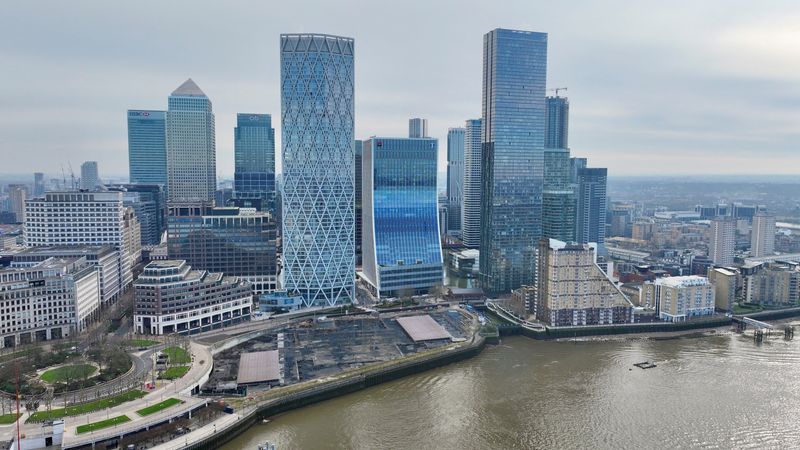
©Reuters. FILE PHOTO: A drone view of London’s Canary Wharf financial district, two days before the government presents its critical pre-election budget, in London, Britain, March 3, 2024. REUTERS/Yann Tessier /file Photo
2/2
By Iain Withers and Marc Jones
LONDON (Reuters) – Some big Chinese developers are set to sell more properties in Britain to raise cash, estate agents say, making the most of a slowly thawing market and buyers betting on a recovery.
Data compiled by MSCI Real Assets for Reuters shows Chinese developers have been net sellers for three years, losing UK real estate worth 1.4 billion pounds ($1.8 billion).
This contrasts with the £12.8 billion that Chinese developers invested in Britain between 2014 and 2020.
The impetus to sell stems largely from the collapse of China’s real estate sector starting in 2021, when a debt-fueled regulatory crackdown on construction triggered a liquidity crunch.
The resulting financial crisis hit some of China’s largest real estate players, including Country Garden and Evergrande, and led to a retreat from markets including Australia and New York.
Commercial real estate values have also plummeted globally due to steep financing costs and the post-COVID work-from-home trend, leading to a collapse in business activity.
“You wouldn’t sell right now unless you really have to,” said Chris Gore, a veteran London property consultant at Avison Young, pointing out that commercial property prices in London have corrected by 15%-20% in the last two years .
In Britain, net sales activity by Chinese developers peaked at £1.2 billion in 2022 before falling to £80 million in 2023, MSCI Real Assets data shows.
But last year’s figure has already been surpassed in 2024, with £110m of net sales, as estate agents report a recent resurgence in buying interest.
The requests came in locally and from abroad, including from other parts of Asia and wealthy family offices with deep pockets, they told Reuters.
Britain has returned to becoming Europe’s favorite destination for property investment in 2024, after a six-year hiatus, a survey by property fund trade body INREV has found.
Some Chinese developers’ need for cash and some buyers’ growing belief that property prices may have recovered more quickly in Britain than elsewhere could spur more business and make the country a particular focus, estate agents say.
For buyers with enough money this offers “a very attractive opportunity to come and make hay,” said Rasheed Hassan, head of global cross-border investments at estate agency Savills.
Market conditions are expected to thaw in 2024 if the Bank of England eases funding costs, which should help London sales, property experts said.
Britain has already seen a significant revision in commercial property prices, INREV said, potentially putting it at an advantage and setting it up for recovery.
“We happen to be more likely to find buyers in more liquid markets,” such as Britain, said Ben Chow, head of real estate research for Asia at MSCI.
CoStar data shows that Chinese developers have sold commercial properties in the UK to a variety of buyers over the past two years, including Britain, Canada, Malaysia and Japan.
However, striking more deals will depend on Chinese developers accepting significantly lower prices, real estate agents said, with distressed assets more likely to reach the market via receivership, leading to protracted sales processes.
In Canary Wharf, east London, the Chinese-owned 5 Churchill Place tower fell into administration last year. It was sold by receivers last month at a 60% discount, a source familiar with the deal said.
Other Chinese developers set to exit this year include Country Garden, which was slapped with a liquidation petition last week. The struggling company has put its flagship development in east London up for sale.
Developer R&F, meanwhile, began talks to sell London’s riverside multi-tower One Nine Elms project to a Chinese rival last month, an R&F stock exchange filing shows.
And a nearly empty Chinese-backed office complex in Royal Albert Dock, east London, was sold last year to British builder and amateur jockey David Maxwell.
“The Chinese bought it with the idea of filling it with Chinese companies,” Gore said. “But that never happened.”
($1 = 0.7878 pounds)